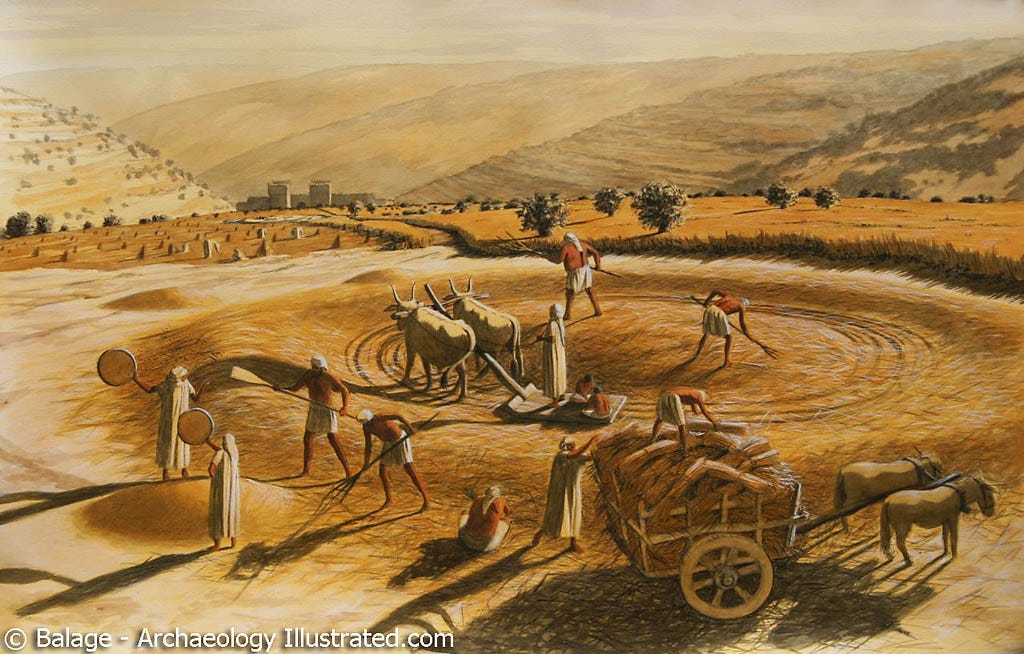The Church is a threshing floor, and Advent is a time of threshing.
Today the harvesting of wheat is made easy by machinery: harvesters and combines. In the time of the Bible things were different. Once the stalks of wheat were cut in the fields and bundled, harvesters would spread them out on a “threshing floor” where they would dry under the sun. This is a flat area of hard ground, located on the top of a hill due to the strong wind (ruah).
Once dried, the stalks of wheat are crushed by a heavy threshing sled, pulled over them by oxen. This breaks the heads from the stalks and loosens the seeds of wheat. After “threshing” comes “winnowing.” Using a large fan-shaped fork, the broken stalks of wheat are thrown into the air. The wheat grains fall back down, while the rest of the dried stem and leaves, the “chaff,” are carried off to the side by the wind.
Through the process of winnowing, the threshing floor is gradually cleared of chaff, leaving only the pure grains of wheat. These are gathered up and stored in the barns, while the pile of chaff is burned.
John the Baptist tells us that the Lord is coming in the power of the Holy Spirit (Ruah) and fire, to bring in his harvest. His winnowing fan is in his hand, and the wheat will be separated from the chaff in order to be collected into his barn.
Our lives are a mixture of good and bad, a combination of precious wheat and useless chaff. It must be winnowed, so that the Lord may receive from us only what is worthy. John prepares people for the Messiah by giving them a spiritual threshing, confronting their sin and challenging the compromised status quo of their lives. Today’s Gospel gives examples of how he challenged various different categories of people such as tax collectors and soldiers (Lk 3:12-14). He also hit the scribes and Pharisees hard (Mt 3:7-10), and reproved King Herod for his unlawful marriage (Lk 3:19)
In order to enter the Kingdom of God, our lives must be challenged and purified. The Messiah will accomplish this with the “Holy Spirit and Fire.” The Holy Spirit – “Ruah” – is the “wind” by which we are sifted and winnowed. He is also the Fire which burns away the chaff:
“Each man’s work will become manifest; for the Day will disclose it, because it will be revealed with fire, and the fire will test what sort of work each one has done. If the work which any man has built on the foundation [of Christ] survives [the fire], he will receive a reward. If any man’s work is burned up, he will suffer loss, though he himself will be saved, but only as through fire” (1 Cor 3:13-15). In this passage of Scripture, St. Paul explains that “gold, silver, and precious jewels” will survive the fire, whereas “wood, hay, and stubble,” i.e. chaff, will not.
Only the pure wheat freed from chaff is brought into the barn; only a purified soul freed from sin and attachment to the world will enter heaven. Advent is a time to examine our lives and discern the wheat from the chaff, focusing on what is truly important and worthy of God, eliminating that which is superfluous and useless. How we spend our time, the way in which we give gifts, the manner in which we conduct our business – is it worthy of the Lord? Will it endure the Fire of the great day?
The Temple in Jerusalem was originally built on a threshing floor indicated by an angel.[1] Every church is a threshing floor, a sacred place where souls are prepared for heaven by sorting out the good from the bad. The proclamation of God’s Word and the sacred preaching office continue the work of John the Baptist, who prepares the way of the Lord in people’s lives. And just as the winnowing process requires repetition in order for the chaff to be blown aside, the process of holiness requires repeated lessons from the Scriptures, Sunday after Sunday.
But we must have no doubt, this is what is taking place by our faithful attendance at Mass, and our faithful attentiveness to the Scriptures. The harvest of the faithful, cut from the field of the world and brought to the threshing floor of the Church, are now being dried, crushed, and sifted by the wind of the Holy Spirit. The Lord’s baptism, which is a baptism of fire, purifies the members of the Church and makes them holy, worthy to be gathered into heaven.
Let us welcome this ongoing process of purification, submitting our lives to the prophetic word, preparing them for the Lord.
[1] And Gad came that day to David, and said to him, “Go up, rear an altar to the Lord on the threshing floor of Araunah the Jebusite” (2 Samuel 24:18). Then Solomon began to build the house of the Lord in Jerusalem on Mount Moriah, where the Lord had appeared to David his father, at the place that David had appointed, on the threshing floor of Ornan the Jebusite (2 Chronicles 3:1)



